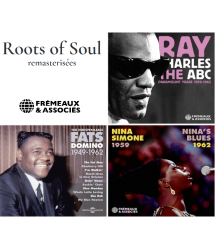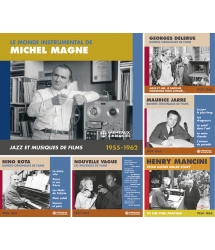"At this point, Django Reinhardt’s place as the first really great European jazz musician seems more secure than ever. There are probably more young musicians playing in the manouche style than any other kind of swing jazz and not a year passes, it seems, without some new continental phenom being heralded as the new bearer of the torch.
All of this is well and good, but it has some curious aspects, one of which is the continuing tendency of the Djangophiles to act as if the only valuable things their hero ever did were the prewar recordings with violinist Stephane Grappelli and the Quintette du hot Club de France. As is often the case with such generalizations, there’s enough truth to make arguing the opposing view awkward and any appreciation of the great gypsy’s legacy should indeed begin with those classic Hot Club sides. But there’s much more to it than that. For one thing, some of Django’s best early work was done with Americans like Coleman Hawkins, Benny Carter and Bill Coleman. For another, the postwar Reinhardt-Grappelli reunions include many stunning performances. But the main point is that Django continued to develop in his later years and his powers as a soloist never waned.
In late 1947, Grappelli and Reinhardt began to work together again intermittently and the best of these collaborations should be heard by any Django fan. Indeed, Vol. 16 (1948) is so strong that listeners who don’t feel the need to hear every note should at least see about picking up this set on its own. Incredibly, the French record companies turned their noses up at Django during this period and from March 1948 until May 1951 the only studios he entered were in radio stations, often in Italy. By this time there were no more collaborations with Grappelli or American musicians and the most interesting thing about these later dates, besides Django’s still-fiery solos, is the occasional presence of such young musicians as Claude Bolling and Martial Solal. But more than half of Vol. 20 is given over to recently-discovered items from earlier times, including a few terrific Hot Club tracks and we can hope that more will turn up."
by Duck BAKER - ALL ABOUT JAZZ - NEW YORK
All of this is well and good, but it has some curious aspects, one of which is the continuing tendency of the Djangophiles to act as if the only valuable things their hero ever did were the prewar recordings with violinist Stephane Grappelli and the Quintette du hot Club de France. As is often the case with such generalizations, there’s enough truth to make arguing the opposing view awkward and any appreciation of the great gypsy’s legacy should indeed begin with those classic Hot Club sides. But there’s much more to it than that. For one thing, some of Django’s best early work was done with Americans like Coleman Hawkins, Benny Carter and Bill Coleman. For another, the postwar Reinhardt-Grappelli reunions include many stunning performances. But the main point is that Django continued to develop in his later years and his powers as a soloist never waned.
In late 1947, Grappelli and Reinhardt began to work together again intermittently and the best of these collaborations should be heard by any Django fan. Indeed, Vol. 16 (1948) is so strong that listeners who don’t feel the need to hear every note should at least see about picking up this set on its own. Incredibly, the French record companies turned their noses up at Django during this period and from March 1948 until May 1951 the only studios he entered were in radio stations, often in Italy. By this time there were no more collaborations with Grappelli or American musicians and the most interesting thing about these later dates, besides Django’s still-fiery solos, is the occasional presence of such young musicians as Claude Bolling and Martial Solal. But more than half of Vol. 20 is given over to recently-discovered items from earlier times, including a few terrific Hot Club tracks and we can hope that more will turn up."
by Duck BAKER - ALL ABOUT JAZZ - NEW YORK










